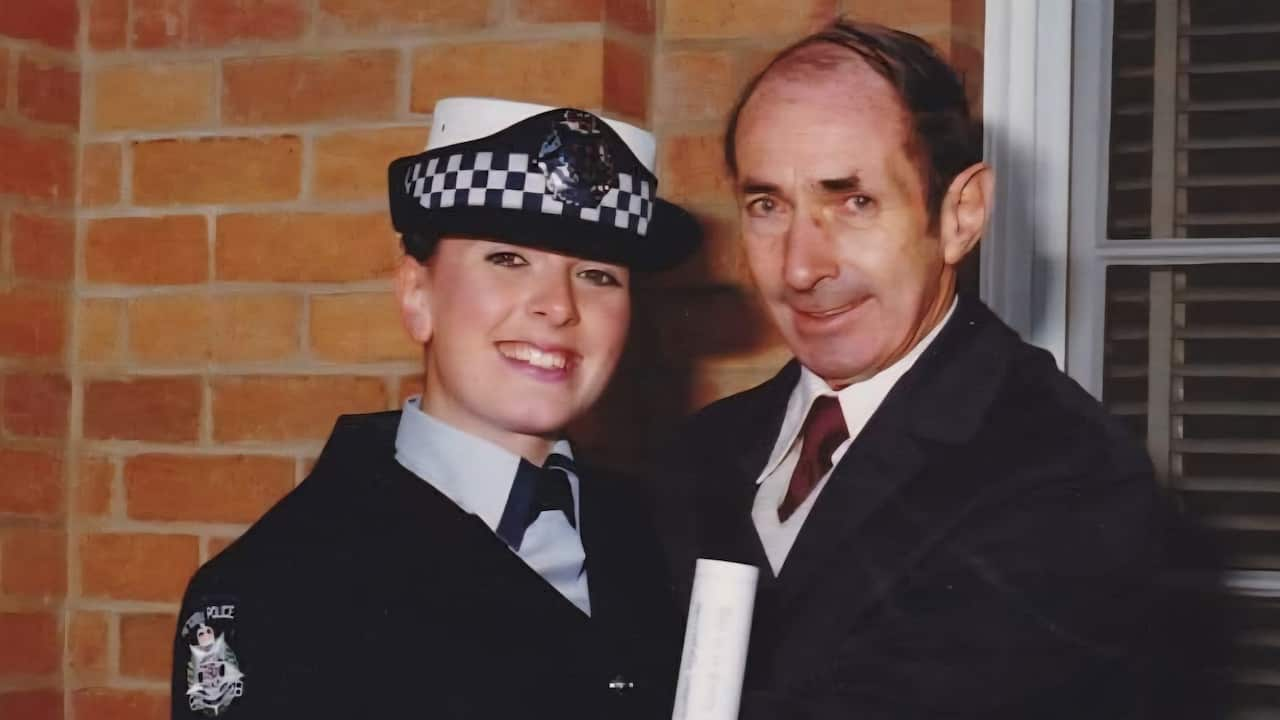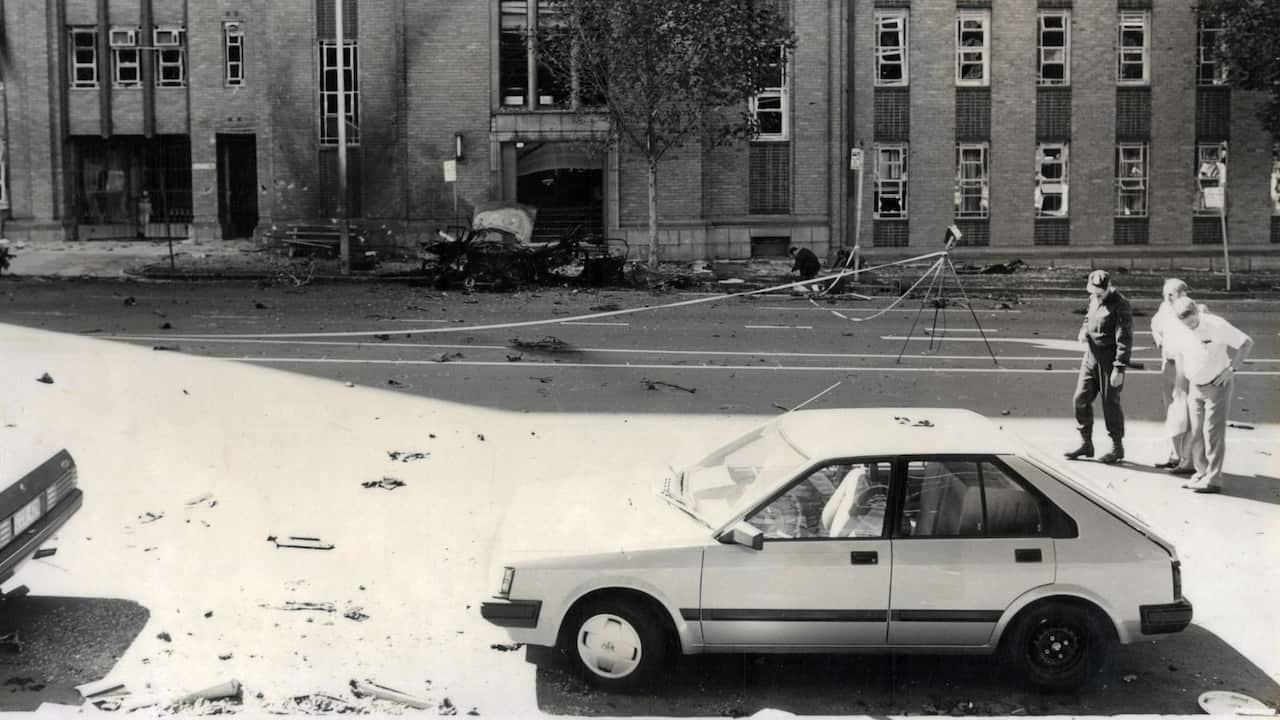Thousands of vacancies for police officers across Australia are making it harder for police to safeguard the public. From workplace culture, management support and recruitment initiatives, what needs to be done to retain serving officers? Watch Insight episode Thinning Blue Line Tuesday on SBS On Demand.
Stream free On Demand

Thinning Blue Line
episode • Insight • News And Current Affairs • 51m
episode • Insight • News And Current Affairs • 51m
My life changed forever at 1.01pm, Thursday 27 March 1986 at Russell Street Police Station in Melbourne.
I was 21 years old, working as a constable, and was due to start the afternoon shift at 1pm.
Normally, I walked into work through the south door entrance. But for some reason that day, I arrived early at 12.40pm and went through the back door — a way I had never used before.
Twenty-one minutes later, there was an explosion.
There was a pop, a red flash and the room filled with smoke.
Windows shattered, the building shook, dust filled the air.
The force was so sudden, so violent that it threw me off my chair to the other side of the room.
I thought that I had been shot; nothing else could explain the power that hit me.
For a moment, I couldn't breathe. My body buzzed with shock; my ears were ringing so much that I couldn't hear anything, and I was so confused.
Was this an accident? Was there another bomb? Would there be more?

Despite this, I stayed on duty. I worked for nine hours, helping to direct traffic through the chaos — past the car where the bomb detonated.
Had I taken my usual route into work through the south entrance and been just a minute late, I would have walked past the car around the time it exploded.
I didn't realise the extent of my injuries — the visible ones or the invisible ones. Adrenaline kept me moving, pushing me forward when my body wanted to collapse.
I didn't go to the hospital until an inspector drove past and saw me struggling to stand and drove me there.
I was told I had a back injury, was sent home in a wheelchair, and stayed in bed for the next eight days.
'PTSD doesn't vanish'
The fear and hypervigilance I felt walking back into work eight days later was almost harder than the bombing itself.
Every sound, every movement triggered an alarm in me. My body on edge, bracing for the next attack.
I walked back to my desk, where a bomb expert told me that a piece of chipboard — that had been randomly against the window — saved my life.
It was a big thing to absorb.

I don't recall the noise of the bomb at the time; it took a while to understand the effect it had on me.
Many years later, there was a name for what I was experiencing: post-traumatic stress disorder (PTSD).
For decades, I lived with invisible scars. I carried on, pushing through — as so many police people do.
But the effects have stayed with me. Sleep can be elusive while thunderstorms and loud bangs make my heart race.
PTSD doesn't vanish. It lingers and reshapes how you move through the world.
'Behind every badge is a human being'
In 2023, I travelled to Ukraine to help with humanitarian aid, which forced me to confront my trauma head-on — by walking into a war zone.
Strangely, that journey brought me a sense of peace I hadn't known for decades.
It didn't erase the past, but it helped me reclaim part of myself.
I want people to know that PTSD is not a weakness. It’s an injury — just as real as a broken bone ...Debra Richardson
Now, I am the CEO of Police Veterans Victoria. Every day I meet men and women who, like me, carry the weight of their service. Some bear visible wounds; others carry invisible ones.
One in three of our 7,000 veterans, upon joining, report living with PTSD or another mental health condition. Behind every statistic is a person, a family, a story.
The stigma around mental health still exists. Too many veterans suffer in silence, believing their pain is weakness, or that they should "just get over it". That silence can be deadly.
I want people to know that PTSD is not a weakness. It's an injury — just as real as a broken bone; and it deserves the same compassion and medical attention.
I was lucky on that day in March 1986. If I had walked through the south door, if I had been two minutes late for work, my story might have ended.
Instead, I was given the chance to keep living, to keep serving, to keep making a difference.
I loved my job and I only left the force in 1994 when I had children, as there wasn't the option to work part-time back then.
While one bomb changed my life, connection with others has sustained me. Connection to my colleagues, to my community, and now to the veterans who trust me to walk alongside them.
Behind every badge is a human being deserving of dignity, respect and healing. I want this for all of us who once served.
Readers seeking support can contact Lifeline crisis support on 13 11 14, Suicide Call Back Service on 1300 659 467. More information is available at beyondblue.org.au and lifeline.org.au.
For further information about PTSD contact the SANE Australia Helpline 1800 18 SANE (7263) www.sane.org or talk to a medical professional or someone you trust.
And for more stories on sex, relationships, health, wealth, grief and more, head to Insightful — an SBS podcast series hosted by Kumi Taguchi. Follow us on the SBS Audio App, Apple Podcasts, Spotify, or wherever you get your podcasts.
Insight is Australia's leading forum for debate and powerful first-person stories offering a unique perspective on the way we live. Read more about Insight
Have a story or comment? Contact Us


